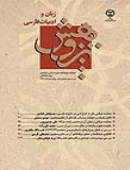مضامين عرفانی در غزليات صائب
محورهای موضوعی : Research in Iranian classical literatureحسين فقيهي 1 * , حسن شاهیپور 2
1 -
2 -
کلید واژه: صائب, مضامين عرفانی عرفان عملی عرفان نظری,
چکیده مقاله :
صائب تبريزی شاعر توانمند و اديب هنرمندی است که در روزگار خود در هند، ايران و آسيای ميانه شهرت بسزايی يافته بود، و اين عظمت و افتخار آنگاه برای وی حاصل شده است که در شيوه شاعری طرزی نو و در محتوای سخنش به ايراد نکتههای دقيق اخلاقی، حکمی، اجتماعی و عرفانی پرداخته است که به اشعار، شکوه و جلال خاصی بخشيده است. سبک شعری صائب به شيوه شاعران عهد صفوی، پر از مضمونهای دقيق و انديشههای باريک و خيالهای ديرياب، به ويژه تمثيلات يا معادلههايی است که مخصوصاً در غزليات به بهترين وجه آمده است. اغلب در بررسی غزليات صائب، تنها به مضامين باريک ادبی و کلام تخيلی و دور از ذهن او توجه کردهاند. اما به مضامين والای عرفانی و صوفيانه صائب نپرداختهاند. هيچ گاه صائب به عنوان شاعر عارف و پايبند به آرا و انديشههای صوفيانه در عهد صفويه مورد نظر نبوده است. نگارنده در صدد است به اين موضوع بپردازد که شعر صائب علاوه بر جنبههای ادبی، اجتماعی، حکمی و اخلاقی، دارای مضامين بلند عرفانی است و به حق میتوان گفت صائب شاعر بیمدعايی بوده است که غزلياتش تبلوری از افکار و انديشههای صوفيانه است.
Saeb Tabrizi was a talented literary man who earned fame in his own time in India, Iran and mid-Asia. As a matter of fact, once Saeb created new methods in poetry, and simultaneously discussed precise moral, social, mystical and thoughtful points, he gained such honor and position. These features granted a particular grandeur and magnificence to his poetry; especially his sonnets. Saeb’s poetic style goes back to the methods used by the poets of the Safavi era; possessing rich, subtle and specific themes, thoughts and also rare visions and imaginations; specifically true in the case of his parables or equivalents. Many of the scholars and researchers have merely considered the subtle literary themes, in addition to the imaginative and abstract words in the survey and study of Saeb’s sonnets. Yet they have constantly neglected one point; his poetic verses enjoy pure and prominent mystical and Gnostic expressions. Actually Saeb has never been considered as a mystical poet faithful to Gnostic and mystical thoughts in the Safavi era. The writer of this paper intends to prove that Saeb’s poetry not only enjoys literary, social, thoughtful, and moral aspects, but also bears grand mystical themes. Saeb is actually a very modest poet whose sonnets are a manifestation of Gnostic thoughts and attitudes. Anyhow, no one regarded him as a mystical poet and he was always introduced as a poet following the Indian School innovating creative methods and offering rare and witty contents. Saeb himself never regarded himself mystical either.

